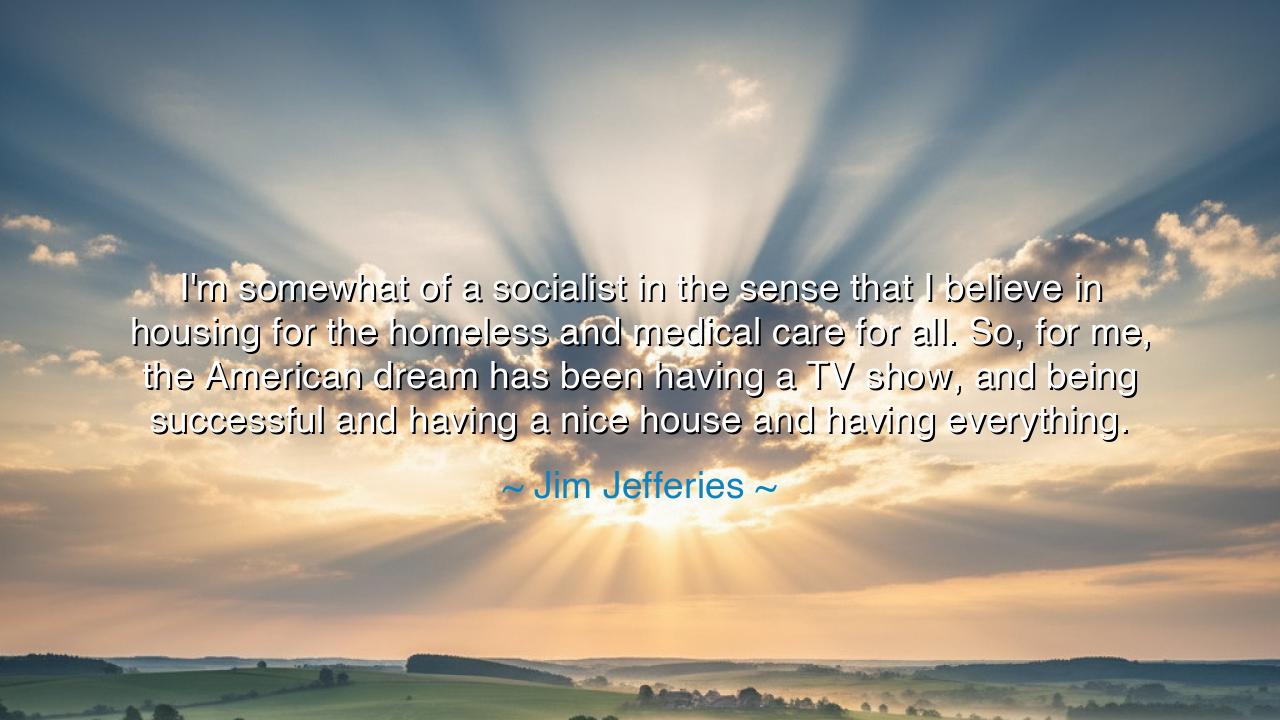
I'm somewhat of a socialist in the sense that I believe in
I'm somewhat of a socialist in the sense that I believe in housing for the homeless and medical care for all. So, for me, the American dream has been having a TV show, and being successful and having a nice house and having everything.






“I’m somewhat of a socialist in the sense that I believe in housing for the homeless and medical care for all. So, for me, the American dream has been having a TV show, and being successful and having a nice house and having everything.”
Thus spoke Jim Jefferies, the jester-philosopher of our age — a man who cloaks truth in laughter and irony in insight. His words may appear lighthearted, yet beneath their humor lies a deep meditation on justice, compassion, and the meaning of success. In this confession, Jefferies unites two seemingly opposite visions: the socialist’s dream of shared care and the individualist’s pursuit of personal achievement. His message is not one of contradiction, but of harmony — that one can desire both personal comfort and collective dignity, that the fullness of human life is found not in greed nor in guilt, but in balance.
The origin of this quote lies in Jefferies’ journey as an Australian comedian who found fame in the United States — a land defined by the myth of the American Dream. To him, that dream was realized in tangible form: success, stability, and the freedom to create art on his own terms. Yet, even amidst his achievements, he could not ignore the inequities he saw around him — the homeless without shelter, the sick without care, the workers exhausted by systems that valued profit more than people. His words therefore emerge from the tension between gratitude and conscience: gratitude for his own blessings, and conscience that demands those blessings be shared, at least in spirit, with the forgotten.
When he calls himself “somewhat of a socialist,” he does not speak of ideology, but of empathy. His socialism is not one of revolution, but of recognition — the belief that in a civilized world, no one should perish for lack of medicine, nor freeze for lack of a home. The medical care for all he invokes is not merely a policy ideal, but a moral declaration: that life itself must not be rationed according to wealth. For in the end, what is success worth if one’s fellow humans must suffer in its shadow? His words remind us that prosperity without compassion is a gilded emptiness — a dream realized at the cost of another’s despair.
History bears witness to this truth. In the early 20th century, the steel magnate Andrew Carnegie, who amassed vast wealth during the rise of American industry, came to a similar revelation. Though he built an empire through ruthless competition, he later devoted his fortune to libraries, universities, and causes for the common good, declaring that “the man who dies rich dies disgraced.” Like Jefferies, he saw that personal success must lead to service, lest it turn hollow. The ancient balance between the individual and the collective, between private joy and public duty, is not a modern struggle but an eternal one — and Jefferies’ humor, though modern in tone, sings that same ageless note.
In speaking of “having everything,” Jefferies touches on the paradox of fulfillment. To possess all material comforts — a house, success, recognition — yet still perceive the plight of others, is to realize that contentment is not ownership, but awareness. His words suggest that the truest wealth lies not in accumulation, but in gratitude paired with generosity. For even in laughter, his tone carries a hint of melancholy — the recognition that the dream so many chase can only be complete when it includes not just the self, but the society that sustains it.
Jefferies’ quote also serves as a critique of the modern illusion that compassion and ambition are enemies. The ancients knew better. The philosopher Marcus Aurelius, emperor and stoic, ruled with both firmness and mercy, understanding that strength without virtue is tyranny, and virtue without strength is helplessness. Likewise, Jefferies teaches — through jest and sincerity — that success need not harden the heart. The true hero, whether emperor or entertainer, is one who builds his own home while helping another find shelter. To dream only for oneself is to live half a life; to dream for all is to live abundantly.
The lesson that flows from his words is one of balance, gratitude, and moral courage. Seek your dream — build, create, achieve — but do not forget the humanity from which that dream arises. Use your success as a platform for kindness, your voice as an instrument of truth. If you possess comfort, let it not blind you to those who live without it. Support the systems that lift others, not because you are told to, but because compassion is the highest expression of civilization.
So, my listener, let this teaching echo within you: to dream for oneself is natural; to dream for others is divine. The artist who attains fame yet advocates for fairness, the worker who earns well yet gives freely, the leader who rules yet remembers the weak — these are the modern heroes, the heirs of ancient wisdom. Jim Jefferies reminds us, through humor and honesty, that the American Dream, or any dream, reaches its noblest form not when one man “has everything,” but when all may live with dignity. For in that shared humanity lies the truest measure of success — the wealth of a compassionate heart.






AAdministratorAdministrator
Welcome, honored guests. Please leave a comment, we will respond soon